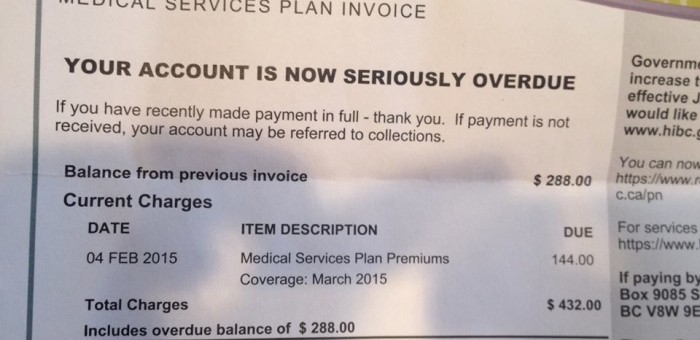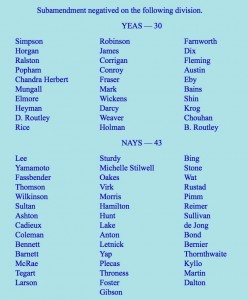Health
BC Liberals Reject Progressive Approach on MSP Premiums
Today in the legislature we were debating an amendment to the motion that the Speaker do now leave the Chair for the House to go into Committee of Supply”. The BC NDP added the following text:
“That the government recognize the cumulative effect of the increases in MSP taxes, hydro rates, ICBC premiums, and other fees and hidden taxes, on British Columbia families.”
I took the opportunity to subamend the amendment by adding:
“And in order to ease the burden facing these families, support rolling the currently regressive and unfair MSP premiums into the income tax system in a revenue neutral manner to create a progressive health care levy.”
The BC NDP supported my subamendment which was defeated by the Liberal majority (vote reproduced below). I also supported the BC NDP amendment that was also defeated by the BC Liberals.
In voting the way they did on my subamendment, the BC Liberals made it very clear that they are not interested in fixing the regressive nature of the MSP premiums. I found this very odd in light of the fact that the Premier recently stated, “Here is the thing about the MSP system is it is antiquated, it is old, and the way people pay for it generally doesn’t make a whole tonne of sense…“. If you ask me, this is nothing short of a caucus vote of non confidence on the Premier’s position on the MSP Premium file.
Below is the text (and video) of my speech in support of the BC NDP amendment and my subamendment.
Text of my Speech
A. Weaver: It gives me great pleasure to rise in support of the motion put forward by the member for Nelson-Creston and seconded by the member for Port Coquitlam: “That the Speaker do now leave the Chair for the House to go into Committee of Supply be amended by adding the following, ‘That the government recognize the cumulative effect of the increases in MSP taxes, hydro rates, ICBC premiums, and other fees and hidden taxes, on British Columbia families.'”
I rise in support of this for numerous reasons. The first, of course, is that this government is proud of its triple-A credit rating and its balanced budget. I am proud of the balanced budget. However, the choices this government has made are such that it is those who can least afford it who are the ones paying the costs of balancing the budget.
It’s a biased budget, one that puts the poor, those with disabilities, those who can barely make ends meet and families second. It puts vested interests, the development industry, first and foremost.
This government touts the fact, through self-congratulatory rhetoric, that it is fiscally responsible. Let me be very clear: this government is fiscally reckless.
Take Site C, for example — the biggest item by far in the budget that is not being addressed in detail, an item with an $8.7 billion price tag that will almost certainly come around $12 billion to $13 billion when all is said and done. It’s a project that received virtually no attention in this budget and only had one line item to it. That’s Site C, as mentioned previously, by the minister before me.
The Premier recently stated that she wanted to move this project “past the point of no return,” but in her haste to get to yes, she is throwing fiscal caution to the wind. The government is pushing forward with a massive pet project that was created for a yet-to-materialize LNG industry — a project that has seen numerous cost overruns already, and yet it has barely started.
This government is plowing forward with a substantial risk that is borne on the backs of B.C. taxpayers — those who are not only paying the price through increases in MSP premiums, through increases in hydro rates, through increases in ICBC premiums, but who also being burdened with debt for years to come for a yet-to-materialize LNG industry, a project that has seen, as I mentioned, numerous cost overruns.
The government wants to appear to be fiscally responsible, but it’s gambling with our tax dollars. Why are we pushing ahead with a project that is riddled with legal challenges and massive environmental consequences? Why is the government not taking a step back and putting the interests of regular working people first and foremost? The British Columbians who actually vote the MLAs in here — why are they not putting their interests first?
Why is this government not taking that step back? British Columbians want this government to wait for the report from the Auditor General, who is currently examining the Site C project, and learn whether this project is actually fiscally sound. Frankly, to push ahead is simply reckless.
With Site C, it’s easy to see we’re going into a big debt for a project we don’t need, and in doing so we are flooding our energy market with taxpayer dollars that are actually driving investment out of our province. And again, to make ends meet, we increase MSP rates. We increase hydro rates and on and on and on.
Just two weeks ago, the Canadian Wind Energy Association announced that it was closing its office and leaving B.C. because the government and B.C. Hydro are just not interested. Last year we saw the same thing with EDP Renewables — no interest from the government for a roughly $1 billion wind power investment off southern Vancouver Island. That company has walked as well.
Despite the potential in this province, clean energy investment is leaving British Columbia in droves. The B.C. Liberals’ dream — they continue to dream of LNG — has not materialized, but they’re still using billions of taxpayer money to gamble on projects designed to support it. They are pushing risky projects past the point of no return and, in so doing, clean tech investment out of our province.
Let’s take a look at these LNG figures that the Minister of Environment has presented in the budget, figures that were supposed to help fuel a prosperity fund instead of it being fuelled through MSP premium increases and so forth, which this amendment is attempting to address.
I love talking about LNG. I love talking about it, just like I loved talking about the tooth fairy when I was a little child. Those of us outside the government’s self-congratulatory circle of hyperbola know that they had….
Hon. A. Wilkinson: Hyperbole. “Hyperbola” is a mathematical term.
A. Weaver: Hyperbole. Thank you to the Minister for Advanced Education for pointing out that hyperbola is a mathematical term.
Those of us outside of government’s self-congratulatory circle of hyperbole already know that they have no hope of tapping into an LNG market in the short term, no hope whatsoever. No amount of tax cuts, no amount of subsidies to the industry, no amount of praying to the LNG god…. We just know it’s not going to happen. They’ve tried and failed.
This year’s budget shifted the LNG story to a future supply-demand gap slotted to emerge ten years from now. Uh-oh. Never mind the “unforeseen global conditions.” So how are we going to make ends meet? We’re going to tax those who are least able to afford it through increases in MSPs, increases in hydro rates and so forth, which is exactly what this amendment is trying to quantify and recognize.
Now we’re talking about LNG in, say, the mid-2020s, something that I’ve been saying for quite some time. Yet the government’s track record of repeatedly failing to predict the LNG future even months in advance does not instill in me, let alone in British Columbians, with any confidence as to what their projected supply and demand will be like in 2030.
On the demand side, there are challenges as well. While the increasing competitiveness of the renewables, as recently highlighted by economists, it seems unlikely that demand projections, illustrated by the curious unlabelled graph in the 2016 budget document, will be accurate either. Simply making up numbers.
This government is chasing a falling market, in which it was a late player, and throwing good money after bad. Let’s take a look at this prosperity fund in a little more detail. This is a fund that the government promised to implement through vast amounts of moneys coming from LNG revenues. Instead, we see increases to the MSP premium, hydro rates, and so on, in order to fund the prosperity fund on the back of individual taxpayers.
I have always advocated that it’s our responsibility as legislators to not think merely of today’s British Columbians but also those of future generations who will follow us — though in a more responsible, realistic manner than the government’s “LNG for our grandchildren” rhetoric mantra.
Indeed, this is the main reason I chose to run for office in first place. But the fact is that if this government were serious about reducing the debt of this province, they would not grow the debt of this province each year. They would not create a loophole allowing them the ability to not pay down the debt with surplus revenues but, in fact, use taxpayer money for political posturing, which is what the prosperity fund is all about.
It gets worse. My fears were confirmed when I looked into the specifics of the prosperity fund being funded through taxes on those who can least afford it — the subject of the amendment before us. Let’s break it down. We have $100 million going into this prosperity fund this year and, according to this year’s budget, no further investments in our province’s savings account in any subsequent year. That’s hardly prudent fiscal planning. And curious, it’s in a year leading up to the election.
Of that $100 million, this government is putting a full half of it towards debt retirement. Hang on. That’s not $100 million. It’s $50 million in the prosperity fund. But then they actually say that only 25 percent of the $100 million will be saved, while the last 25 percent will go towards “government priorities.” Clearly, MSP premiums are not the government’s priority.
What is the government priority? Probably boutique handouts as we move into the election year in May of next year. In fact, when we tone down the self-congratulatory rhetoric that this government is issuing and tune into the actual numbers, we find that this government’s $100 million prosperity fund is actually a one-time investment of $25 million. This is a blatant misrepresentation of how tax dollars are being spent.
Also, the government tried to mislead the voters of B.C. that their empty promises are not actually empty. They’re doing this to create a potential political play to try to tempt the opposition to vote against prosperity. That’s shameful — nothing more than political posturing in the hope that they can turn around and say that the opposition votes against prosperity.
This opposition votes for prosperity. But prosperity is more than just the bottom line in the so-called prosperity fund. It’s prosperity in social prosperity. It’s environmental prosperity. It’s fiscal prosperity. It’s triple-bottom-line prosperity. For this government, prosperity simply means prosperity for those who happen to give them large donations to ensure that they remain in power. It is not a prosperity for all British Columbians. It is a very limited prosperity.
With that in mind, and in light of the fact that the motion to amend the statement “That the Speaker do now leave the Chair” is before us, I will, at this time, introduce notice to subamend that motion with the idea of adding the following:
I move the following subamendment:
[Be it resolved that the motion “That the Speaker do now leave the Chair” be amended by adding the following:
“That the government recognize the cumulative effect of increases in MSP taxes, hydro rates and ICBC premiums, and other fees and hidden taxes, on British Columbia families,”
And in order to ease the burden facing these families, support rolling the currently regressive and unfair MSP premiums into the income tax system in a revenue neutral manner to create a progressive health care levy.]
Deputy Speaker: So, Member, are you going to speak on the amendment to the amendment?
A. Weaver: Correct.
Deputy Speaker: Okay. Carry on.
On the subamendment.
A. Weaver: On the subamendment, I have but one statement. I am going to quote Tom Fletcher from Black Press, president of the legislative press gallery. The quote is this. “Green leader has it right.”
The Vote
Video of my Speech
am
65,721 Signatures and Counting – No More MSP Head Tax
Today in the legislature I presented a petition by 65,721 British Columbians, started by Michelle Coulter in Ucluelet. The petition calls on government to abolish BC’s regressive approach to collecting MSP premiums and switch instead to a progressive system. As the petition states, “BC should follow the lead of other provinces in eliminating its flat-rate MSP premiums.”
Earlier this year I renewed my call to eliminate MSP premiums and pointed out that we don’t have to look far for alternatives. British Columbia should follow the path taken by Ontario in 2004 when they introduced the Ontario Health Premium (OHP), and rolled it into their income tax system.
In Ontario if you earn $20,000 or more a year you pay the OHP. It ranges from $0 if your taxable income is $20,000 or less, and goes up to $900 per year if your taxable income is more than $200,600. Instead of the mail-out system we have in BC, the OHP is deducted from the pay and pensions of those with employment or pension income that meets the minimum threshold. The full range of premium rates in Ontario for those at different incomes can be viewed here.
Remember – only Ontario’s top earners are paying $900 per year. Right now people in British Columbia are paying $900 a year regardless of whether they earn $30,000 or $3,000,000 a year.
Below are the text and video of my introduction of the petition. I also append a copy of the media release associated with it.
Petition Introduction Text
It gives me great pleasure to present a petition with 65,721 signatures from people across British Columbia calling on the government to abolish B.C.’s regressive approach to collecting MSP premiums. As the petition states, B.C. should follow the lead of other provinces in eliminating flat-rate MSP premiums
Petition Introduction Video
Media Release
Media Release: February 11, 2016
Andrew Weaver presents MSP petition with 65,721 names
For Immediate Release
Victoria, B.C. – Andrew Weaver, Leader of the B.C. Green Party and MLA for Oak Bay-Gordon Head, tabled a 65,721 signature petition in the legislature today calling on the government to eliminate B.C.’s regressive ‘one-size-fits-all’ approach to collecting MSP premiums.
“It is clear that too many British Columbians are struggling with the fixed and increasing cost of MSP Premiums in this province. It is a regressive fee that is hurting those who can least afford it,” said Weaver.
The petition, created by small business owner Michelle Coulter from Ucluelet, B.C., was started in December and has received widespread support from across the province.
“Right now whether you make $30,000 or $3,000,000 annually in you are paying $900 a year,” said Weaver. “In Ontario, only the top earners making more than $200,600 are paying this rate.”
The B.C. Green Party has proposed the introduction of a progressive system in which rates are determined by one’s earnings, mirroring the model used in Ontario. Rolling MSP premiums into the existing income tax system would allow the fee to be graduated and lead to a significant net administrative savings to taxpayers.
“The B.C. Government takes almost as much revenue from MSP Premiums as it does from corporate income tax,” said Weaver. “It’s time we followed the path Ontario has taken and rolled the MSP Premiums into our income tax system.”
In 2004 the Ontario government introduced the Ontario Health Premium (OHP), and incorporated it into their income tax system. In Ontario if you earn $20,000 or more a year you pay the OHP. It ranges from $0 if your taxable income is $20,000 or less, and goes up to a maximum of $900 per year if your taxable income is more than $200,600. Instead of the mail-out system we have in B.C., the OHP is deducted from the pay and pensions of those with employment or pension income that meets the minimum threshold.
“The government’s recently announced change for single parent families is a step in the right direction but doesn’t go far enough to help numerous British Columbians who cannot afford the increases,” said Weaver. “If the government is serious about easing the burden it is placing on low and fixed income British Columbians, then they need to properly fix the way MSP premiums are collected.”
-30-
Media Contact
Mat Wright
Press Secretary – Andrew Weaver MLA
Cell: 250 216 3382
Mat.wright@leg.bc.ca
Twitter: @MatVic
Celebrating Local Businesses in Our Community – Victoria Eye
 Dr. Olivia Dam cheerfully handed my colleagues and me hairnets and booties before leading us into the operating area. In the middle of the first room sat a very large laser. We were in a building not far from my constituency office, taking a tour of Victoria Eye and learning more about the services they offer our community.
Dr. Olivia Dam cheerfully handed my colleagues and me hairnets and booties before leading us into the operating area. In the middle of the first room sat a very large laser. We were in a building not far from my constituency office, taking a tour of Victoria Eye and learning more about the services they offer our community.
The impressive piece of machinery in front of us was a Femtosecond refractive laser, Dr. Dam told us, which she uses to perform cataract surgeries. It is the latest technological advancement in the field, allowing her to make a precise 4.9 millimeter capsulotomy incision into the eye and softening the cataract in less than a minute. Dr. Dam assured the more squeamish members of my team (i.e. me) that she uses local anesthesia and a suction-based docking station to keep the eye still and pain free throughout the procedure. “If there is anything that can make the surgery better for the patient, we use it,” Dr. Dam said. “We keep up to date with the very latest technological advancements.”
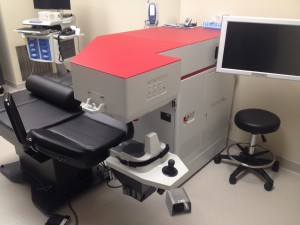 Victoria Eye was the first facility in Western Canada to receive a consignment of the most progressive extended range lenses available and is the only eye center on Vancouver Island with a Femtosecond refractive laser for refractive cataract surgery. Because these advancements are not classified as medically required to complete cataract surgery, however, they are not insured.
Victoria Eye was the first facility in Western Canada to receive a consignment of the most progressive extended range lenses available and is the only eye center on Vancouver Island with a Femtosecond refractive laser for refractive cataract surgery. Because these advancements are not classified as medically required to complete cataract surgery, however, they are not insured.
From the surgery center we head past the entirely sterile “clean room” and into the recovery room where a row of curtain separated beds (all empty that day) line the wall. Dr. Dam brings out a silver tray to show us the instruments used during eye surgeries.
 Watching Dr. Dam’s steady hand demonstrate how she uses each tiny instrument was fascinating. Because their facility is not located in a hospital, each of the five doctors who work at Victoria Eye are trained in advanced life support. Thankfully those skills are rarely if ever needed, but if anything were to come up every patient is in very good hands.
Watching Dr. Dam’s steady hand demonstrate how she uses each tiny instrument was fascinating. Because their facility is not located in a hospital, each of the five doctors who work at Victoria Eye are trained in advanced life support. Thankfully those skills are rarely if ever needed, but if anything were to come up every patient is in very good hands.
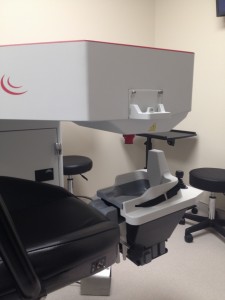 Dr. Dam is a comprehensive ophthalmologist specialized in managing medical and surgical ocular problems. She did her medical degree and ophthalmology specialization at Queen’s University in Ontario before completing five years of surgical residency. She has participated in medical service and ophthalmological trips to South Africa, Mozambique, Malawi, South Africa, Zimbabwe, Columbia, South East Asia, India and Bolivia. She moved to Victoria in 2005 and has been caring for patients here ever since.
Dr. Dam is a comprehensive ophthalmologist specialized in managing medical and surgical ocular problems. She did her medical degree and ophthalmology specialization at Queen’s University in Ontario before completing five years of surgical residency. She has participated in medical service and ophthalmological trips to South Africa, Mozambique, Malawi, South Africa, Zimbabwe, Columbia, South East Asia, India and Bolivia. She moved to Victoria in 2005 and has been caring for patients here ever since.
As Vancouver Island’s demographic continues to age the demand for eye care is going to greatly increase. The Victoria Eye center was built anticipating this shift and they are prepared to ramp up care to meet the need. They have capacity for eight doctors, maybe more as many split their time with the hospital.
 Collaborating with different eye specialists in one center, Dr. Dam explains, allows them to share expertise, consultations, and the cost of cutting edge equipment. Staying current with the latest technological advancements is far from cheap, Dr. Dam said, but they invest in whatever will make procedures more efficient, effective, and pain-free for their patients. Victoria Eye has been a multi-million dollar project that is ongoing as continues to invest in new technologies to optimize patient care.
Collaborating with different eye specialists in one center, Dr. Dam explains, allows them to share expertise, consultations, and the cost of cutting edge equipment. Staying current with the latest technological advancements is far from cheap, Dr. Dam said, but they invest in whatever will make procedures more efficient, effective, and pain-free for their patients. Victoria Eye has been a multi-million dollar project that is ongoing as continues to invest in new technologies to optimize patient care.
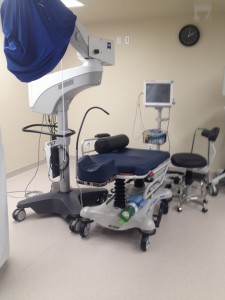 Some types of extended benefits cover surgeries done at their center, but some people also chose to pay out of pocket for the latest and greatest. The Symfony Extended Range lens can cost a few thousand dollars per eye, but Dr. Dam says many people are willing to invest in the new technology because unlike traditional multifocal lenses it allows you to focus within near, intermediate and distance ranges, it doesn’t cause halos or glare, and is especially good for patients with presbyopia.
Some types of extended benefits cover surgeries done at their center, but some people also chose to pay out of pocket for the latest and greatest. The Symfony Extended Range lens can cost a few thousand dollars per eye, but Dr. Dam says many people are willing to invest in the new technology because unlike traditional multifocal lenses it allows you to focus within near, intermediate and distance ranges, it doesn’t cause halos or glare, and is especially good for patients with presbyopia.
Whatever patient’s condition or ability to pay privately, Dr. Dam and her colleagues aim to provide Victoria with the best possible eye care. They have the capacity to treat urgent issues right away, vision surgeries can be done within a few weeks, and the waitlist for the treatment of less serious chronic conditions is rarely longer than a few months.
 At the end of the tour we head back through the main hall and stop to look at the incredible series of paintings hanging along the wall. The artists are students from local schools, Dr. Dam tells us. I have no doubt their work will be admired and appreciated by everyone who walks through that hall, but even more so by patients with renewed vision.
At the end of the tour we head back through the main hall and stop to look at the incredible series of paintings hanging along the wall. The artists are students from local schools, Dr. Dam tells us. I have no doubt their work will be admired and appreciated by everyone who walks through that hall, but even more so by patients with renewed vision.
Age-Based Federal Health Transfer Overdue in BC
I am very pleased to read today that the Minister of Health has taken up a suggestion I brought to the legislature last year. On CBC’s On The Island this morning, Health Minister Terry Lake told host Gregor Craigie that he will urge Ottawa to change the way health transfers are made during next week’s federal-provincial meeting.
British Columbia has a higher proportion of seniors than the rest of Canada and it is this age demographic that requires more health services. The funding we receive should reflect the actual cost of services delivered and I am pleased to hear that Minister Lake plans to raise this with Federal government.
Below I provide more details.
The Canada Health Act and Canada Health Transfer
The federal Canada Health Act sets the standards for all provinces and requires coverage for all necessary care provided in hospitals and by physicians. But health care is ultimately the responsibility of the province.
General revenues from the Federal Government provide funding for health care to the provinces and territories through the Canada Health Transfer (CHT). Up until this past year, the CHT consisted of two components: a cash transfer and a tax transfer. Though CHT is allocated on a per capita basis, the cash transfer was not. Instead, the CHT cash transfer would take into account the value of provincial and territorial tax points and the fact that provinces do not have equal economies and, therefore, have unequal capacity to raise tax revenues. This meant that provinces with the highest revenue raising ability received lower per capita CHT cash payments than other provinces.
However, since January 2014, CHT allocations are now determined solely on an equal per capita cash basis. While this new system means that all provinces will receive equal transfer payments based on population size, I believe that this is not the most equitable way to proceed, particularly in light of provincial age demographics and associated health care costs. Take for example BC, a province many view as a popular retirement destination. It is common practice for individuals who have lived and worked – and therefore paid taxes – elsewhere, to move to BC later in life. However, with national trends showing that seniors’ health care costs more than that of any other age group, this can put a significant strain on our provincial health care system — one that cannot afford to go unaccounted for (see Figure 1).
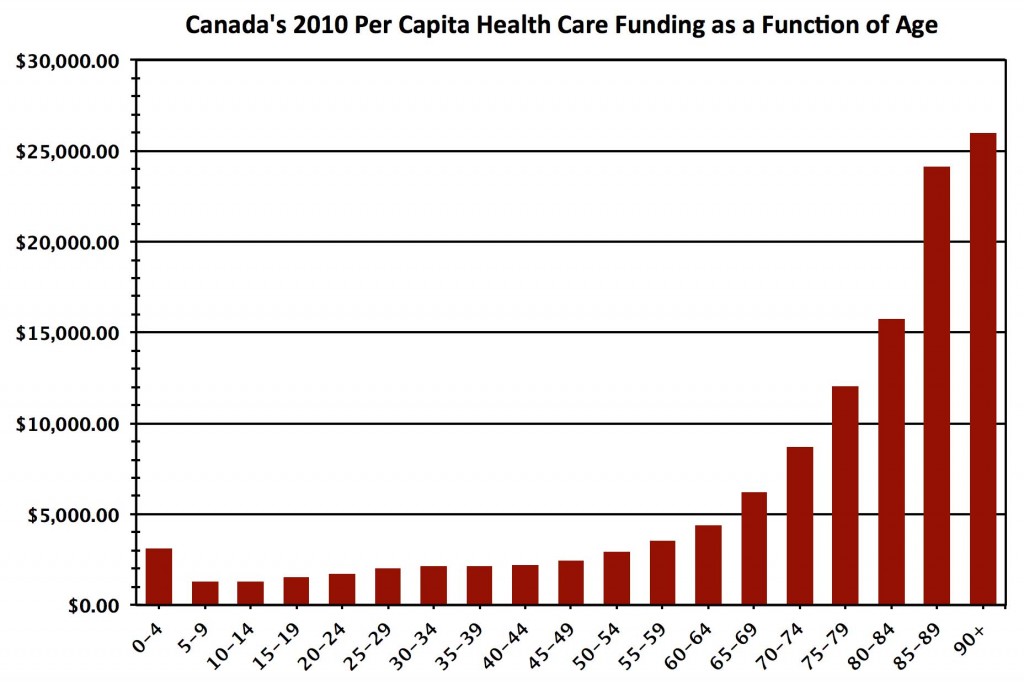 Figure 1: Per capita funding of health care as a function of age. Note that as age increases, health care costs increase dramatically. Annually, more than $25,000 is spent on health care costs for a Canadian over the age of 90. Source: Canadian Institute for Health Information, National Health Expenditure Trends, 1975 to 2012.
Figure 1: Per capita funding of health care as a function of age. Note that as age increases, health care costs increase dramatically. Annually, more than $25,000 is spent on health care costs for a Canadian over the age of 90. Source: Canadian Institute for Health Information, National Health Expenditure Trends, 1975 to 2012.
Let’s unpack this further. In the 2014-15 budget year, the Federal Government Canada Health Transfer amounted to 32.1 billion dollars distributed across all provinces. In 2014 Canada’s population was estimated to be 35,540,400, and British Columbia’s population was estimated to be 4,631,300. Alberta has a similar population to that of British Columbia (see Table below).
| Province | Population | Ages 0-14 | Ages 15-64 | Ages 65+ |
| Alberta | 4,121,700 | 18.3% | 70.4% | 11.3% |
| BC | 4,631,300 | 14.6% | 68.4% | 17.0% |
As clearly evident in Figure 2, British Columbia had a smaller percentage of its population in every age group under the age of forty than the Canadian average. The opposite is true for those over the age of forty. Compared to Alberta, British Columbia is home to nearly 70% more seniors. A quick glance back at Figure 1 immediately highlights the glaring inequity in the fixed CHT dollar per person transfer formula. British Columbia has a higher proportion of seniors than the rest of Canada and it is this age demographic that requires more health services. The funding should reflect the actual cost of service delivery.
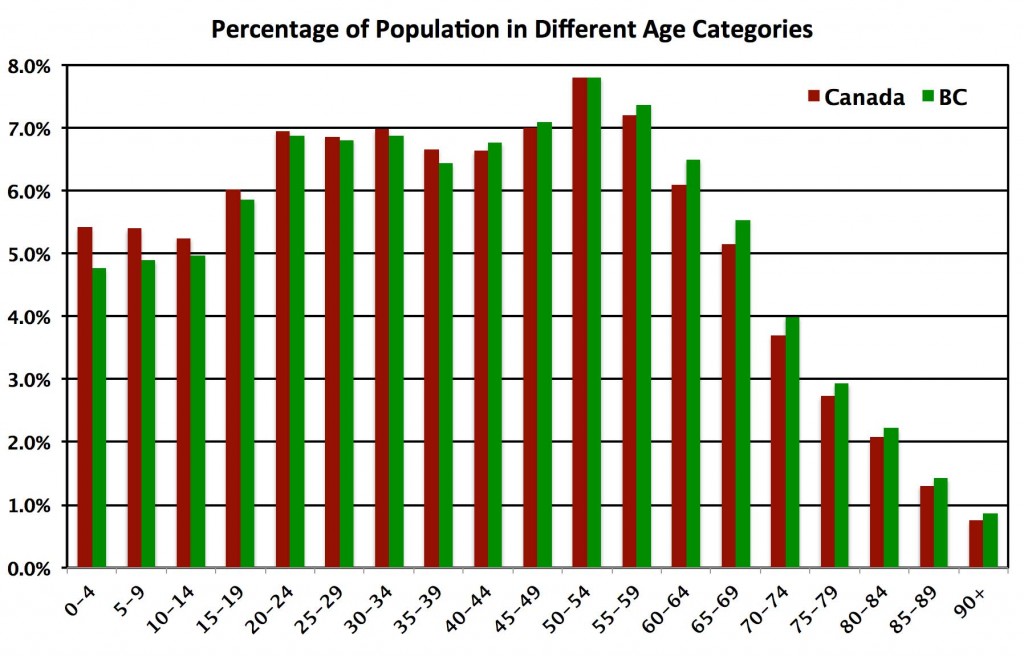 Figure 2: Percentage of overall population in separate age categories for Canada (Red) and British Columbia (Green). Note that the percentage of overall population under the age of 40 is greater in Canada in a whole than in British Columbia. The reverse occurs over the age of 40 when health care costs per capita start to increase. Source: BC Stats and Statistics Canada.
Figure 2: Percentage of overall population in separate age categories for Canada (Red) and British Columbia (Green). Note that the percentage of overall population under the age of 40 is greater in Canada in a whole than in British Columbia. The reverse occurs over the age of 40 when health care costs per capita start to increase. Source: BC Stats and Statistics Canada.
It’s a relatively straightforward calculation to weight the CHT transfer to each province by its age demographic and associated health care delivery cost. Rather than receiving 13.0% ($4.183 billion) of the total CHT funding (reflecting 13.0% of Canada’s population residing in British Columbia), we should receive 13.5%. While this may not seem like a lot, it translates into 153 million dollars that British Columbia must find from other sources.
Nevertheless, no matter the method that CHT payments are allocated, these federal transfers only cover a portion of BC’s annual healthcare expenditures. The remaining expenses are financed out of general revenues raised by tax and non-tax sources, with MSP premiums presently contributing over $2 billion per year.
A Renewed Call to Eliminate MSP Premiums
In case you weren’t aware, life just got a little more expensive for British Columbians.
Medical Service Plan (MSP) Premiums have just gone up again. This tax is applied to anyone living in BC for six months or longer and requires them to pay monthly premiums for health care coverage. While some individuals can apply for premium assistance, these subsidies dry up as soon as a person earns a net annual income of $30,000 or more.
Healthcare costs money. There’s no denying that we need to support the medical services we rely on.
However the way MSP Premiums work in British Columbia is regressive, hurting those who can least afford it.
It’s time we followed the path Ontario has taken and rolled the MSP Premiums into our income tax system.
The Problem
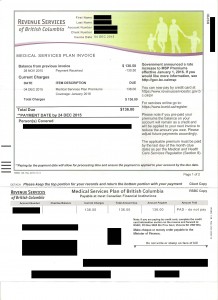 Currently in BC a person who earns $30,000 a year pays the same rate for their MSP Premiums as someone who is earning $3,000,000 a year. This is what it means to have a regressive tax – what you pay is not based on what you make.
Currently in BC a person who earns $30,000 a year pays the same rate for their MSP Premiums as someone who is earning $3,000,000 a year. This is what it means to have a regressive tax – what you pay is not based on what you make.
MSP Premiums become even more regressive when you factor in who actually pays them. The fact is, many large employers pay all or part of an employee’s MSP premium as part of a negotiated taxable benefit of employment. But for many, if not most, low and fixed income British Columbians, as well as small business owners, they must pay the costs themselves.
And they have been going up constantly.
Back in 2000, the MSP premium for a single individual was $36/month. Today that same individual pays more than twice as much, now up to $75/month. Just since 2010 there has been a 40% increase. For a family of three your new rate as of January 1st 2016 is $150/month, up from $142/month.
Let me put this another way: The BC Government rakes almost as much revenue in from MSP Premiums as it does from corporate income tax.
The government’s response has generally been to point out that it does have some premium assistance available. But this too is not without significant issues.
First, the assistance program is an opt-in program rather than an opt-out. One academic paper found that 26% of families that earned less than $30,000 a year were not enrolled in the system.
Second it would be a mistake to assume that once you are earning $30,000 a year that this is now an affordable tax.
Before moving on I’d like to acknowledge, with thanks, Lindsay Tedds at the UVic School of Public Administration for her thoughtful blog post on this issue.
MSP Premiums are a regressive tax that are contributing to the issue of affordability so pervasive in our province. What do we do about it?
The Solution
The answer to my previous question is very straightforward. British Columbia should follow the path taken by Ontario in 2004 when they introduced the Ontario Health Premium (OHP), and rolled it into their income tax system.
In Ontario if you earn $20,000 or more a year you pay the OHP. It ranges from $0 if your taxable income is $20,000 or less, and goes up to $900 per year if your taxable income is more than $200,600. Instead of the mail-out system we have in BC, the OHP is deducted from the pay and pensions of those with employment or pension income that meets the minimum threshold. The full range of premium rates in Ontario for those at different incomes can be viewed here.
Remember – only Ontario’s top earners are paying $900 per year. Right now people in British Columbia are paying $900 a year regardless of whether they earn $30,000 or $3,000,000 a year.
Next Steps
It is past time that the BC Government adopt this straightforward change. Last year, when I brought this issue up there was an outpouring of interest and support for the idea. Even the government indicated that they weren’t opposed to talking about it.
Yet, a year later, nothing has changed except that MSP Premiums have once again gone up.
This needs to be corrected. The 2016 budget will be tabled on February 16th 2016. Please join me in calling on our government to implement this common sense change for inclusion in this year’s budget.
One thing is certain, as Leader of the BC Green Party I can attest to the fact that a BC Green Party government would eliminate the regressive monthly MSP premiums. Instead, a BC Green government would introduce a progressive system in which rates are determined by one’s earnings. And a net administrative savings to taxpayers would arise in rolling MSP premiums into the existing income tax system.

